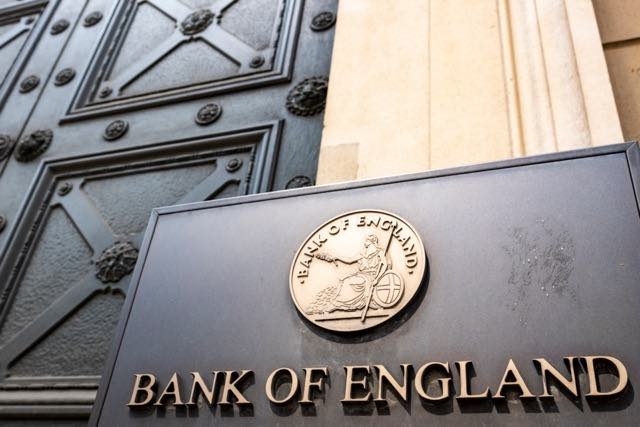
Bank of England cuts base rate 25 bips to 4.75%

The Bank of England's Monetary Policy Committee (MPC) has today voted to cut the base rate from 5% to 4.75%.
The decision falls a reduction in CPI inflation to 1.7% and was widely expected.
In August, the Bank cut the base rate by 0.25 percentage points (0.25%) to 5% - its first cut in over four years. The rate stayed the same at the last review.
The Bank of England's Monetary Policy Committee voted by a majority of 8–1 to reduce the Bank Rate by 0.25 percentage points, to 4.75%. One member wanted to maintain Bank Rate at 5%.
The MPC said there had been, "continued progress in disinflation", particularly as previous external shocks have abated, but remaining domestic inflationary pressures were resolving more slowly.
While CPI inflation fell to 1.7% in September it is expected to rise to about 2.5% the end of the year as weaker energy prices drop out of the annual comparison.
Annual private sector regular average weekly earnings growth has continued to fall but remained elevated at 4.8% in the three months to August, the MPC said.
The MPC says that headline GDP growth is expected to fall back to its recent underlying pace of around 0.25% per quarter over the second half of this year.
The MPC expects the labour market to continue to loosen, although it appears "relatively tight" by historical standards.
CPI inflation is projected to fall back to around the 2% target in the medium term.
The combined effects of the measures announced in Autumn Budget 2024 are provisionally expected to boost GDP by around 0.75% at their peak in a year’s time, relative to August projections.
The Budget is provisionally expected to boost CPI inflation by just under 0.5% at the peak.
The MPC says there remains significant uncertainty around the outlook for the labour market. Data is difficult to interpret and wage growth has been more elevated than usual. The impact of the Budget announcements on inflation will depend on the "degree to and speed with which" these higher costs pass through into prices, profit margins, wages and employment.
Based on the evolving evidence, a gradual approach to removing policy restraint remains appropriate, the MPC said. The Committee says it will continue to monitor closely the risks of inflation persistence.
Industry experts said the base rate move, continuing a downward trend, was widely anticipated but the Bank had a difficult balancing act ahead.
Shamil Gohil, portfolio manager at fund manager Fidelity, said: “As the market largely expected, the Bank of England cut its base rate by 25bps to 4.75%. Given the decreasing trajectory in domestic inflation, especially in services and wages, this is not a surprise.
“Going forward, the Monetary Policy Committee has a tough job balancing the future impact of the UK budget and government’s fiscal policy. Cost increases for companies from higher taxes, national insurance and national minimum wage will likely be at least partially passed on to consumers via price hikes next year.
"Fiscal stimulus should also have a positive impact on growth allaying any recessionary fears. Therefore, the sensible path continues to be for a gradual and cautious easing process as these affects are slowly realised over time. Looking ahead, the implications of the US election and potential for higher global tariffs may offset some of this growth and may also feed into higher inflation as the second order impact of these tariffs take hold across Europe and China, potentially muddying the waters.
“The market has priced out aggressive cuts next year post the UK Budget to a more shallow cutting cycle, with the terminal rate now projected closer to 4% (previously ~3.5%).”
Adam Ruddle, chief investment officer at LV=, said: “With the headline inflation rate at 1.7% and the persistent services inflation component falling below 5% for the first time since May 2022, the Bank of England had sufficient latitude to continue cutting interest rates.
“However, the UK Budget is expected to increase inflation through fiscal expansion and increased business taxes that will likely be passed on to consumers. Before the recent Budget and the US presidential election - where tariffs are a driver of inflation - the market had anticipated five rate cuts over 2025, but this may fall to three or four because of inflationary pressures.
“Lower rates will be welcome news for the 60% of consumers who hold some form of debt, particularly mortgage holders, where according to LV= research, one in five are worried about their repayments.”
Simeon Willis, chief investment officer at pensions firm XPS Group, said: “Given the boost to public spending and upwards pressure on inflation resulting from Rachel Reeves’ Autumn budget, the markets had factored in a less rapid easing of the Bank rate.
"This MPC announcement is in keeping with that revised expectation, although as is often the case, it is the longer-term rate of easing that is of greatest interest. Movements of 0.25% in themselves are relatively inconsequential. The path of expected rate reductions likely remains cautious particularly given the OBR’s inflation outlook for 2025 being above target.”
• The next Bank of England base rate decision will be on 19 December.
